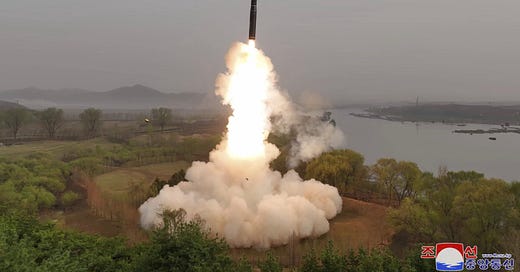Air Koryo flights; Hwasong-18 origins; Tehran to receive its USD6 billion; Iran gets BRICS invite
Prohibited Transactions for the week of 21 Aug 2023 (#16)
North Korea
An Air Koryo flight from North Korea landed in Beijing on Tuesday, the first commercial flight between the two countries since January 2020. A flight between Pyongyang and Beijing had been scheduled for Monday, but was cancelled last minute by Air Koryo with no explanation. The airline also announced two flights starting this week between Vladivostok and Pyongyang. //It’s not a lot of aviation activity, but any sort of movement by the DPRK to open its borders means one more physical pathway to smuggle goods in or out of the country.
North Korean representatives participated in a trade fair in the Chinese city of Changchun, the capital of Jilin province.
Claims by a researcher that a recently revealed North Korean intercontinental ballistic missile (ICBM), the Hwasong-18 (HS-18), was likely built with technical cooperation from Russia — and is similar to a Russian ICBM — has set off a debate among arms control experts. //It is a bit of a technical argument, but what is of interest to us is the export control implications of North Korea’s missile development, especially if Pyongyang developed the ICBM independent of Moscow (this appears to be the stronger argument at the moment). As noted in a separate commentary;
North Korea most likely developed the HS-18 on its own, but the missile’s development probably benefitted from steady illicit acquisitions since the breakup of the USSR of significant ballistic missile technology and know-how directly from Russian and other former-Soviet companies, institutes, and individuals. For example, in the early 1990s, North Korea almost certainly illicitly acquired design documents and hired scientists from the Makeyev Rocket Design Bureau responsible for Soviet/Russian submarine-launched ballistic missiles. The HS-18 likewise almost certainly benefitted from steady North Korean acquisitions over the past 25-30 years of dual-use equipment, components and materials from companies and individuals in China (especially) and Russia—both directly and by entities in both countries as fronts to obtain items from third countries.
A joint statement — released by Japan, South Korea, and the US following a trilateral summit between the nations — includes the announcement of a new working group countering North Korean illicit financial and cyber activities. //Will banks have the chance to be involved in Track 1.5 or Track 2 discussions that could inform the new working group?
We express concern regarding the DPRK’s illicit cyber activities that fund its unlawful WMD and ballistic missile programs. We announce the establishment of a new trilateral working group to drive our cooperation, including with the international community, to combat DPRK cyber threats and block its cyber-enabled sanctions evasion.
The US Treasury sanctioned Roman Semenov, a cofounder of Tornado Cash, which itself is a sanctioned virtual currency mixer. Semenov is accused of providing support for North Korean hackers, the Lazarus Group, who are responsible for stealing hundreds of millions of dollars’ worth of digital currencies. According to the US, the Lazarus Group laundered at least USD558 million via Tornado Cash, which took no action to attempt to curtail the illicit activity.
//In case you missed it, this new DPRK Reports project by RUSI and NK News looks to be an immensely useful resource for identifying entities and individuals mentioned in UN Panel of Experts reports.
Iran
//My guess in Issue #15 that there would be a summer slow down of news did not hold true for Iran, with the announcement on 10 August that Tehran and Washington had come to an agreement for a prisoner exchange, as well as allowing the release from South Korean banks of approximately USD6 billion owed to Iran (to be deposited in Iranian banks in Qatar and used for non-sanctioned goods such as food and medical supplies). This week, the US government said the agreement is still “on track.” Some commentary here about why it’s USD6 billion going to Iran, and not the previously spoken of USD7 billion (see Issue #6). The agreement between Washington and Tehran has also led to domestic political debates in Iran.
A seized oil tanker suspected of holding Iranian oil (see Issue #13) has offloaded its cargo via a ship-to-ship (STS) transfer. The tanker was confiscated by the US government in April 2023, and had been held off the coast of Texas. Tehran previously warned that any Western company assisting in the offloading of oil from the tanker would face retaliation. //Is this action somehow related to the recent agreement between the US and Iran? Is Tehran willing to overlook this oil, considering the USD6 billion that is coming their way? Or is the timing of this just coincidental? Is the company or companies involved in offloading the oil fully convinced that Iran won’t engage in some sort of retaliation? The oil appears to have been transferred to the Liberian-flagged MR Euphrates.
Iran, along with five other countries, has been invited to join the BRICS (Brazil, Russia, India, China, and South Africa) group of nations. //Too soon to say what the real long term impact (if any) this will have, but at least in the near term, it shows Iran is not as politically isolated as the US would like. This will be another forum where Tehran can advance its de-dollarization priorities.
A new analysis shows that Western sanctions pressure over the years has landed unequally in Iran, with Iranian elites being able to benefit the most and retaining more wealth, while lower income households suffered drops in income.



